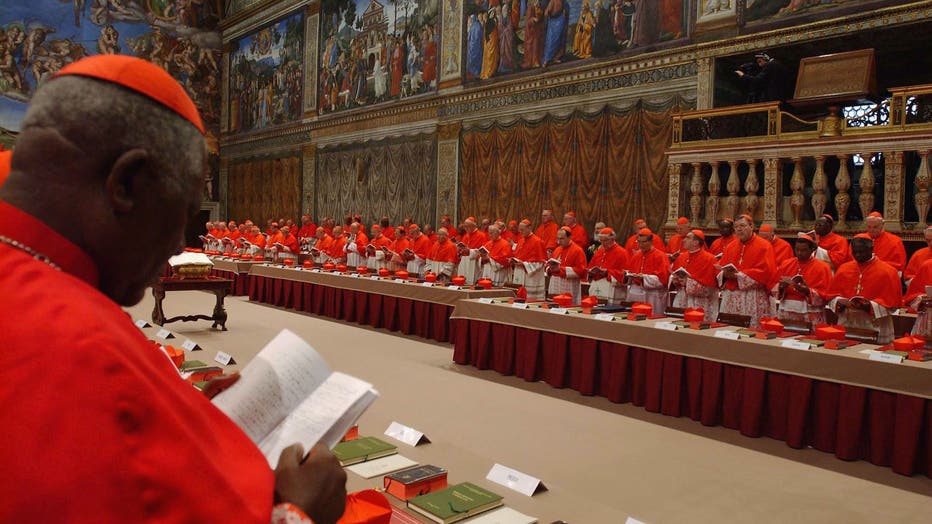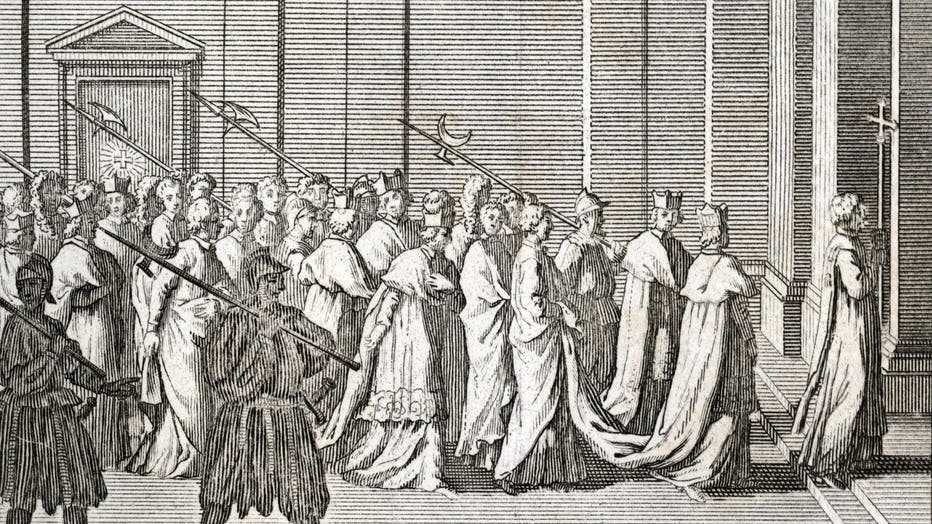Papal conclave: Here's why you won't know the results of the election, other than who wins
PHOENIX - The death of Pope Francis on April 21 also means that a new pontiff for the Roman Catholic faith will be chosen.
According to the Associated Press, the vote for the next pope will take place in secret. Here's why the conclave operates under secrecy.
What is the conclave?

Cardinals of the Catholic Church attend the election conclave in the Sistine Chapel on April 18, 2005 at Vatican City (Photo by Arturo Mari - Vatican Pool/ Getty Images)
Per the Encyclopaedia Britannica, the papal conclave is an assembly of cardinals to elect a new pope.
What Does It Mean?:
According to Merriam-Webster, the word "conclave" is derived from Latin, with a definition of "room that can be locked up."
"Today, conclave refers not to the locked rooms but to the private meetings and secret assemblies that occur within them," read a portion of the dictionary's website.
The first known use of the word dates back to 1524, per Merriam-Webster.
What is the history of the conclave?

A drawing shows the entrance of the cardinals in the Sistine chapel for a papal conclave (Bridgeman via Getty Images)
The backstory:
The Encyclopaedia Britannica states elections for the Bishop of Rome, whose officeholder is the pope himself, were held early on in the Catholic Church's history, with papal elections initially mirroring the election process for bishops in nearby towns at the time.
The current procedures for papal conclaves, per the encyclopedia, began with reforms made in 1059, and the entire procedure was codified in 1904 by way of a constitution that Pope Pius X issued. Changes to the rules were made during the tenure of Pope Paul VI, Pope John Paul II, and Pope Benedict XVI.
The selection of a new pope involves a considerable degree of secrecy: according to the encyclopedia, the area of the papal conclave is sealed for the duration of the conclave, and cardinals are denied access to news media, banned from using phones or computers, and required to swear an oath of secrecy when they enter the place where voting takes place.
Such is the secretive nature of conclaves in the modern era that, according to the Australian Broadcasting Corporation, more is known about what happened in conclaves held during the 16th century than those held in recent years.
Featured
How is a new pope chosen? All about the conclave
The death of Pope Francis brings about a centuries-old conclave tradition to elect the next pope. Here’s what to know.
Why is the conclave so secretive?
The Catholic News Agency reported in 2013, the year when Pope Francis was selected to lead the Roman Catholic faith, that conclaves are events of "the strictest secrecy".
Dig deeper:
The article states that the secrecy aims to preserve the proceeding's impartiality. Indeed, the AP reported that anyone who reveals what went on inside the conclave faces automatic excommunication.
According to a report by United Kingdom newspaper The Independent on April 22, 2025, the secret ballot was introduced as a way to avoid overt politicking. However, the article notes that the conclave is "inevitably a hotbed of competing factions who wish to see their man come out on top."
There are other reasons to sequester the voting cardinals, according to a report by NPR News on April 23, 2025, such as preventing political leaders from swaying the election, and other religious-based reasons.
In the article, a history professor who specializes in Catholic Church history said the religious idea behind the conclave is that "God through the Holy Spirit descends on the cardinals and inspires their choice," and the cardinals have to be "separated away from everybody else while they're making this decision."
Are the ballot results secret?
Big picture view:
The ballot results are secret, in that according to the AP, the ballots cast in each round of voting are burned. Smoke from the burn will tell the world whether a pope has been chosen (white smoke) or not (black smoke).
Despite the secrecy, however, the public does know a certain part of the result: who becomes pope. There is a certain level of ceremony surrounding the start of a new papacy, which includes a Roman Catholic clergy member announcing the new pope's identity, and his regnal title.
In addition, recent popes have also been major worldwide figures.
Have there been leaks from the conclave?
In recent decades, there have been at least two widely-publicized incidents where details of the conclave were leaked. The leaks all involve the 2005 conclave, but did not happen during the course of that year's conclave.
What we know:
In 2024, the AP reported that Pope Francis, in a book written by a Spanish journalist, revealed details surrounding the 2005 conclave that made his predecessor, Benedict XVI, pope.
Pope Francis said during that year's conclave, he was "used" by cardinals who wanted to block the election of Benedict, who was then known as Cardinal Joseph Ratzinger, and that 40 of the 115 votes were swayed his way.
The idea, according to Pope Francis, was not to elect him. Rather, it was to force a compromise candidate after the man who would go on to become Pope Benedict XVI was knocked out of contention. Eventually, Francis said he declared he wouldn't accept the papacy, after which Ratzinger was elected.
Details of the 2005 conclave were also leaked months after that conclave happened, when a report stated that Pope Francis, then known as Cardinal Jorge Bergoglio, was in second place for that year's conclave.
The same report also states that Bernard Law, who was once Archbishop of Boston, received one vote in the final ballot despite having resigned from his post in Boston close to three years prior. According to the BBC, Law stepped down after journalists reported he had moved priests accused of sexual misconduct between parishes, rather than addressing claims made by victims.
Law died in 2017.


